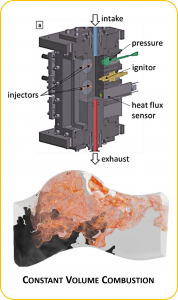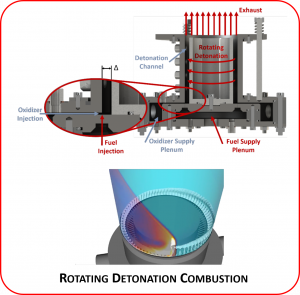 The thermodynamic cycle used in a gas turbine (GT) has undergone little change since its early development. Over the last decades effort has been put into increasing efficiency through reducing losses and raising overall pressure ratio and peak temperature. To break out of current limits a different cycle is required. One of the most promising is the case where a pressure rise across the combustion process is allowed. Cycle models show that such a change would reduce the fuel consumption of a large turbofan engine by ~15% and of a small engine by ~25%. An efficiency increase of up to 20% is also expected for land based GT. The pan-European team assembled offers the possibility of studying the most promising Pressure Gain Combustion (PGC) solutions on an innovative integrated level. Current PGC solutions are of two types, the subsonic type, which is limited by low heat release rate but is already practical and the detonative type, with very high heat release rate but currently impractical. PGC solutions are expected to be key technologies for the efficient use of carbon neutral fuels such as hydrogen. INSPIRE is aimed at studying both technologies, the Constant Volume Combustion, CVC and the Rotating Detonation Combustor, RDC.
The thermodynamic cycle used in a gas turbine (GT) has undergone little change since its early development. Over the last decades effort has been put into increasing efficiency through reducing losses and raising overall pressure ratio and peak temperature. To break out of current limits a different cycle is required. One of the most promising is the case where a pressure rise across the combustion process is allowed. Cycle models show that such a change would reduce the fuel consumption of a large turbofan engine by ~15% and of a small engine by ~25%. An efficiency increase of up to 20% is also expected for land based GT. The pan-European team assembled offers the possibility of studying the most promising Pressure Gain Combustion (PGC) solutions on an innovative integrated level. Current PGC solutions are of two types, the subsonic type, which is limited by low heat release rate but is already practical and the detonative type, with very high heat release rate but currently impractical. PGC solutions are expected to be key technologies for the efficient use of carbon neutral fuels such as hydrogen. INSPIRE is aimed at studying both technologies, the Constant Volume Combustion, CVC and the Rotating Detonation Combustor, RDC.
Around the two WP focusing on CVC and RDC, where institutions such as TUB, ENSMA, CERFACS, and SAFRAN will supervise the experimental and modelling activities of the involved ESR, two additional WP will aim at studying the main phenomena and technologies required to enable PGC solutions on actual engines. Topics as heat transfer, unsteady components interaction, noise generation and overall system performance will be faced by ESR supervised by UNIFI, UNIGE, KTH and TUB.
The training of new researchers familiar with the concepts of PGC will ease the adoption of the technology in European industry. Since the developmental life cycle of GT is long, familiarizing a generation of new researchers with PGC will allow them to grow along with the technology.







 The thermodynamic cycle used in a gas turbine (GT) has undergone little change since its early development. Over the last decades effort has been put into increasing efficiency through reducing losses and raising overall pressure ratio and peak temperature. To break out of current limits a different cycle is required. One of the most promising is the case where a pressure rise across the combustion process is allowed. Cycle models show that such a change would reduce the fuel consumption of a large turbofan engine by ~15% and of a small engine by ~25%. An efficiency increase of up to 20% is also expected for land based GT. The pan-European team assembled offers the possibility of studying the most promising Pressure Gain Combustion (PGC) solutions on an innovative integrated level. Current PGC solutions are of two types, the subsonic type, which is limited by low heat release rate but is already practical and the detonative type, with very high heat release rate but currently impractical. PGC solutions are expected to be key technologies for the efficient use of carbon neutral fuels such as hydrogen. INSPIRE is aimed at studying both technologies, the Constant Volume Combustion, CVC and the Rotating Detonation Combustor, RDC.
The thermodynamic cycle used in a gas turbine (GT) has undergone little change since its early development. Over the last decades effort has been put into increasing efficiency through reducing losses and raising overall pressure ratio and peak temperature. To break out of current limits a different cycle is required. One of the most promising is the case where a pressure rise across the combustion process is allowed. Cycle models show that such a change would reduce the fuel consumption of a large turbofan engine by ~15% and of a small engine by ~25%. An efficiency increase of up to 20% is also expected for land based GT. The pan-European team assembled offers the possibility of studying the most promising Pressure Gain Combustion (PGC) solutions on an innovative integrated level. Current PGC solutions are of two types, the subsonic type, which is limited by low heat release rate but is already practical and the detonative type, with very high heat release rate but currently impractical. PGC solutions are expected to be key technologies for the efficient use of carbon neutral fuels such as hydrogen. INSPIRE is aimed at studying both technologies, the Constant Volume Combustion, CVC and the Rotating Detonation Combustor, RDC.